Books sharing personal experiences
The lived experience of people who hear voices is at the heart of all we do at Intervoice. Below is a selection of books that demonstrate this.

It’s All In My Head
Mick DeSchrijver
It’s All in My Head! is Mick’s story. Mick is a normal Dutch guy who hears voices inside his head other people can’t hear. Is he crazy, psychotic, or a schizophrenic? Mick’s answer to all of these questions is a resounding ‘NO!’ Mick is just a very creative human being! Mick sat down one day and started to illustrate his voices. Taking these illustrations as a starting point, he introduces you to his voices and guides you through the journey he made with these voices. This is a unique and creative story. It is a book of hope for voice hearers, family members, and anyone who is interested in the phenomenon of hearing voices.
Available through Amazon, and also via Mick directly ([email protected])

Living With Voices: 50 Stories of Recovery
Marius Romme, Sandra Escher, Jacqui Dillon, Dirk Corstens, Mervyn Morris (2009)
A new analysis of the hearing voices experience outside the illness model resulted in accepting and making sense of voices. This study of 50 stories forms the evidence for this successful new approach to working with voice hearers.
The voice-hearers featured in this exciting collection come from across the world. Their stories are inspiring, enlightening and – most importantly – honest. It is a must for anyone interested in human experience, resilience and the potential to survive intense, and sometimes overwhelming, experiences.
This book is published through PCCS Books

Tomorrow I Was Always a Lion / A Road Back from Schizophrenia
Arnhild Lauveng (2005)
In this memoir, Arnhild describes her experiences and how she found a way through them. It was originally published in Norwegian, with the second title being used in an English-language version.
Books about Voices & Visions
This section includes some of the key texts that share information about voice-hearing that may be useful no matter what your interest in the subject (personal or professional).
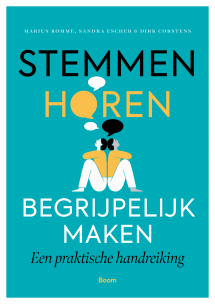
Stemmen horen begrijpelijk maken: Een praktische handreiking
Marius Romme, Sandra Escher, Dirk Corstens (2021)
An updated version of Making Sense of Voices.
See: https://www.boompsychologie.nl/product/100-10125_Stemmen-horen-begrijpelijk-maken

The voice inside: A practical guide for and about people who hear voices
Paul Baker, CreateSpace Independent Publishing Platform (2019)
An introduction to the experience of hearing voices; with advice about how to cope and make sense of the experience and descriptions for voice hearers and workers of new ways of helping to cope better with troubling voices.
This edition includes new sections on talking to voices; recovery practice; hearing voices and schizophrenia; children and hearing voices.
Entendre des Voix: Guide Pratique
by Paul Baker, Mouvement Les Sans-Voix/Association Ecrivains, Poetes & Cie, 1999
French language translation of the introductory booklet to hearing voices, “The Voice inside” by Paul Baker. To order, write to: Mouvement Les Sans-Voix, Case postale, 235, CH – 1211, Geneve 17 or email Theresa Krummenacher [email protected]

Can’t You Hear Them? The Science and Significance of Hearing Voices
Simon McCarthy-Jones (2017)
“The experience of ‘hearing voices’, once associated with lofty prophetic communications, has fallen low. Today, the experience is typically portrayed as an unambiguous harbinger of madness caused by a broken brain, an unbalanced mind, biology gone wild. Yet an alternative account, forged predominantly by people who hear voices themselves, argues that hearing voices is an understandable response to traumatic life-events. There is an urgent need to overcome the tensions between these two ways of understanding ‘voice hearing’.
Simon McCarthy-Jones considers neuroscience, genetics, religion, history, politics and not least the experiences of many voice hearers themselves. This enables him to challenge established and seemingly contradictory understandings and to create a joined-up explanation of voice hearing that is based on evidence rather than ideology.”
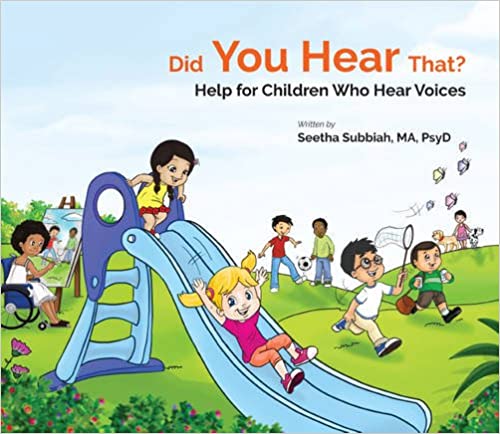
Did You Hear That? Help for Children Who Hear Voices
By Seetha Subbiah (2016)
Did You Hear That? Help for Children Who Hear Voices is about five very different children who share one thing in common — hearing voices and seeing things that are not there.
Susie is a 9-year-old who keeps her challenges with auditory and visual hallucinations a secret until a teacher alerts her parents of her difficulties at school. With compassion, empathy, love and understanding, Susie’s parents encourage her to see a counselor. Susie builds trust and rapport with her counselor, which finally allows her to share her well-guarded secret. After divulging what has been troubling her for years, with her counselor’s help, she discovers that she is not the only one in the world who struggles with voices.

Psychosis as a Personal Crisis: An Experience-Based Approach
Marius Romme & Sandra Escher, ISPS, 2012
“In the entire book, there is a laudable effort to free voice hearers from social silence and stigma, and to promote their participation in self-help groups and forums with other persons who live with or lived through similar experiences.
For this reason, this book is also of fundamental value for the persons who hear voices, for their family and friends. It is also necessary reading for any person interested in this innovating therapeutic avant-garde approach because the Hearing Voices Movement is one of social liberation.” – Manuel González de Chávez, From the Foreword.
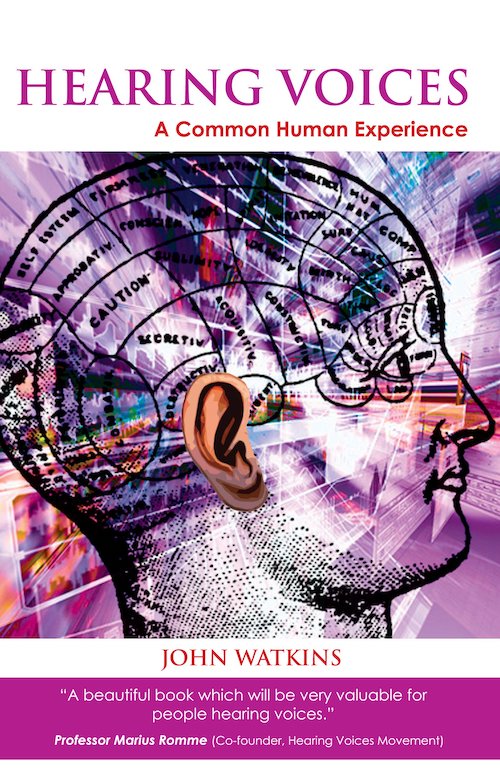
Hearing Voices: A Common Human Experience
John Watkins, Michelle Anderson Publications (2008)
This book contains a wealth of information of great practical value to people who hear voices as well as to those who wish to broaden their understanding of this fascinating phenomenon.
It includes a detailed description of a wide variety of voice experiences, an overview of theories which attempt to explain why they occur and a comprehensive set of practical strategies for dealing with unwanted or disturbing voices.
A beautiful book which will be very valuable for people hearing voices.
Professor Marius Romme (Co-founder, Hearing Voices Movement)

Stimmenhoeren – Botschaften aus einer inneren Welt (Hearing Voices – Messages from an Inner World)
by Irene Stratenwerth and Thomas Bock, Kabel Verlag, 2002.
This book gives a comprehensive overview about the experience of hearing voices by taking into account what voice hearers say and how they cope with their voices.
It is only available in German.
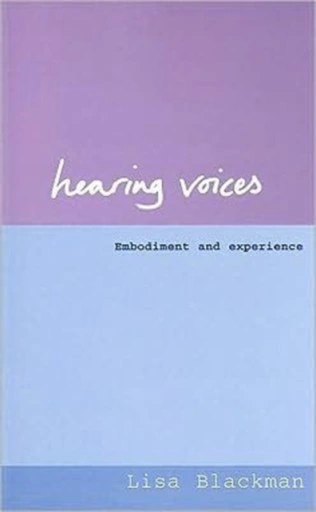
Hearing Voices : Contesting the Voice of Reason
by Lisa Blackman. Free Association, Books 2001.
Editor’s Book Description:
The hearing of voices is generally regarded as a pathological phenomenon, a form of mental illness. This belief in the pathology of hearing voices underpins the diagnostic systems of psychology and psychiatry and most forms of treatment. Hearing Voices, however, would appear to be far more common than often believed. Drawing on her research with the Hearing Voices Network the author reveals how many voice hearers are not suffering from mental illness, and that voice hearers who develop non-psychiatric explanations of their voices may live with them quite well. The pathological consequences of voice hearing are, to a large extent it seems, linked up with the social and psychiatric reaction to the experience. Lisa Blackman has written an important book that bears directly on some of the central assumptions of psychology and psychiatry and questions our understanding of ourselves as rational autonomous human beings.
Lisa Blackman is Lecturer in the Psychology of Communications, Goldsmiths College, University of London.
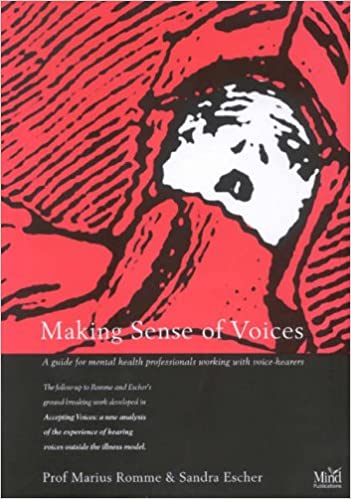
Making Sense of Voices: A Guide for Mental Health Professionals
Marius Romme & Sandra Escher (2000)
This book introduces the Maastricht Interview and how it can be used alongside voice-hearers to support them in exploring and making sense of their experiences.
An updated version is now available in dutch (see below)
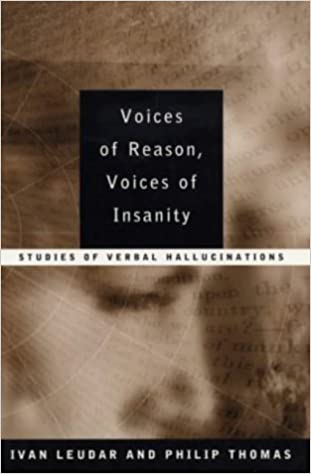
Voices of Reason, Voices of Insanity – Studies of Verbal Hallucinations
by Ivan Leudar and Philip Thomas. Routledge/Psychological Press, 2000.
In this challenging book, psychologist, Ivan Leudar traces voice-hearing and its interpretations through 2,800 years of history. Through six cases of historical and contemporary voice-hearers. Leudar assisted with some contributory chapters by psychiatrist Philip Thomas demonstrates how the direct experience has been changed from being a sign of virtue to being a sign of insanity, signalling ‘psychosis’ or ‘schizophrenia’.
Leudar asks the question if the experience should be taken out of the hands of psychiatry and rehabilitated as a normal, although uncommon human experience.

The Dialectics of Schizophrenia
by Phil Thomas, Free Association Books, 1997
Philip Thomas argues that the most fundamental problem presented to those who suffer from schizophrenia – that their experiences are not ‘understandable’ – arises through psychiatrists’ over-reliance on a flawed interpretation of nineteenth century phenomenology. In particular, the author presents his own recent work with people who hear voices and demonstrates that their experiences are thoroughly understandable placed in the context of an individual’s life history and social and cultural factors.

Accepting Voices: A New Approach to Voice-hearing Outside the Illness Model
By M. Romme & S. Escher. Mind, 1993.
This acclaimed book illustrates how many people who hear voices come to terms with their experience without recourse to psychiatry.
The book focuses on techniques for dealing with voices, emphasising the importance of personal growth.
